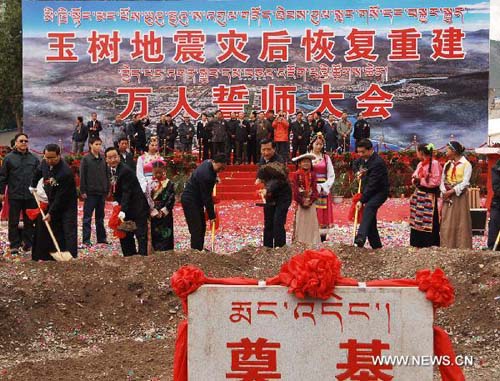Rebuilding of monasteries started in Yushu
|
|
|
A foundation laying ceremony is held in Yushu, northwest China's Qinghai Province, July 10, 2010. China started the reconstruction of the quake-devastated Yushu Saturday. Yushu was devastated by a 7.1-magnitude quake struck on April 14, killing more than 2,200 people and flattening thousands of homes. [Xinhua] |
The Chinese government on Saturday started a massive multi-million-dollar project to restore 87 monasteries damaged in a 7.1-magnitude earthquake that shook a predominantly Tibetan area in northwest China in April.
Monks and officials gathered at the new site of Trangu Monastery in Yushu, Qinghai Province, for a brief ground-breaking ceremony. Monks from the 700-year-old monastery, whose former buildings collapsed in the quake, held a prayer service, chanting sutras and turning prayer wheels to mark the start of the rebuilding.
More than 2,200 people were killed after the 7.1-magnitude earthquake struck Yushu. The entire town of Gyegu, the seat of Yushu prefectural government, was flattened, leaving more than 100,000 residents homeless.
Lodroe Nyima Rinpoche, a living Buhhda of the Trangu Monastery, said monks felt "grateful" for the government efforts to rebuild damaged monasteries.
Three best known monasteries damaged in the Yushu quake were Trangu, Gyegu and Renyak.
The repair of Gyegu Monastery also started on Saturday.
Qinghai's Ethnic Affairs Committee said the central government had earmarked 1 billion yuan for the monastery restoration in Yushu. The construction will cover an area of 170,000 square meters.
Yushu is predominantly populated by ethnic Tibetans and most of them are Buddhists. There were thousands of monasteries, including 194 large or medium ones, in the region before the quake. The number of monks, nuns and other religious personnel was estimated at 23,000, local government data show.
The economic losses of the monasteries and in-house religious relics mounted to 756 million yuan, according to the data.
Monasteries and religious activities form an important part of local residents' daily life. Phuriwa, deputy head of Qinghai's Ethnic Affairs Committee, said the drafts for monastery restoration were revised many times only to best protect the Tibetan culture and to give local Buddhism believers best places to observe religious rituals.
Saturday also marked the start of about 200 rebuilding projects in Yushu, which would cost 16 billion yuan.
China plans to spend 31.7 billion yuan in three years to rebuild Yushu. Funding for the reconstruction will come mainly from the central budget, with contributions from provincial finances and donations, the government said earlier.
 0
0 








Go to Forum >>0 Comments